
Installing a new boiler is a significant decision for any homeowner, not just in terms of cost but also considering the time and disruption involved. Understanding the installation timeline can help you plan effectively and minimize inconvenience.
The duration of a boiler installation can vary based on several factors, including the type of boiler, the complexity of the installation, and any additional work required. For instance, a straightforward replacement of an existing combi boiler with a new one in the same location typically takes around 4 to 6 hours. However, more complex installations, such as converting from a conventional boiler to a combi system or relocating the boiler to a different part of the house, can extend the installation time to 2 to 3 days or more.
It's also worth noting that the vast majority of UK homes, approximately 80%, use combi boilers, which are known for their efficiency and compact size . This prevalence means that many installations are replacements of existing combi systems, which are generally quicker and less disruptive
To find more information relating to this topi, read below. If you need someone to fit your boiler, contact us.
Signs you need a new boiler
Knowing when it’s time to replace your boiler can save you from unexpected breakdowns, rising energy bills, and even health risks. While regular servicing can extend the life of your heating system, there are clear warning signs that a boiler is nearing the end of its useful life.
Here are the most common indicators that it's time to consider a new boiler:
Rising Energy Bills
If your heating bills have increased without a change in usage, your boiler may be losing efficiency. Older models, particularly those over 10 years old, can operate at as low as 60% efficiency, meaning up to 40% of energy is wasted. In contrast, modern A-rated boilers are around 90% efficient, significantly cutting your energy use.
Frequent Breakdowns and Repairs
Are you constantly calling out engineers for repairs? If your boiler is regularly breaking down, especially during cold snaps, it’s often more economical to invest in a new unit than to keep repairing an unreliable one.
Uneven Heating or Hot Water Issues
If some rooms feel colder than others, or your hot water runs out quickly or fluctuates in temperature, this could indicate internal issues such as a failing heat exchanger or sediment build-up in your system.
Unusual Noises
Strange banging, gurgling, or whistling sounds may signal problems such as kettling, which is caused by limescale or sludge buildup. These issues can affect performance and are usually signs your boiler is struggling to operate efficiently.
Yellow Flame or Soot
A healthy boiler flame should be blue. A yellow or orange flame could indicate a carbon monoxide leak, a serious safety risk. Soot or staining around the boiler is another red flag. Always have your boiler checked immediately by a Gas Safe registered engineer if you notice this.
It’s Over 10–15 Years Old
Even if your boiler seems to be working fine, once it reaches 10 to 15 years of age, it’s likely outdated in terms of efficiency and safety features. Newer models come with advanced diagnostics, smart compatibility, and built-in safety functions that older boilers lack.
Types of boiler installations
The time it takes for a boiler installation depends heavily on the type of installation involved. From simple replacements to full system upgrades, each scenario comes with its own set of requirements and timeframes. Below, we break down the most common types of boiler installations and what you can expect from each.
A straightforward boiler swap
This is the quickest and most hassle-free installation type. A straightforward swap involves replacing your existing boiler with a new one of the same type and in the same location. It’s commonly done when the old boiler is beyond economical repair, but the overall system is still functioning well.
Since the pipework, controls, and connections are already in place, installation is usually completed within 4 to 6 hours, although it’s wise to allow a full day to account for safety checks and minor adjustments.
This type of installation:
- Requires minimal disruption
- Is ideal for replacing older combi boilers with newer, more efficient models
- Typically doesn’t involve structural work or electrical upgrades
A boiler relocation
Relocating your boiler to a different room or area of the house adds complexity. This process involves rerouting pipework (gas, water, and heating), potentially altering the flue, and ensuring access to power supplies.
On average, a boiler relocation takes 1 to 2 days, depending on how far the new location is from the old one and the condition of the existing pipework.
Reasons for relocation might include:
- Freeing up space in a kitchen or airing cupboard
- Moving the boiler closer to high-use rooms
- Compliance with modern building regulations
Structural work such as drilling through walls or lifting floorboards is often required, which increases both the duration and the cost.
Installing a brand new boiler
If your home doesn’t already have a boiler or central heating system, installing a new one is a much bigger job. This often applies to new-builds, older properties without central heating, or full renovations.
Installing a boiler from scratch typically takes 1 to 2 days. However, if you are also installing a full central heating system (radiators, pipes, controls), the job can stretch to up to 2 weeks, depending on the size and layout of the property.
This type of installation includes:
- Connecting to gas and water mains
- Installing heating controls and a thermostat
- Running pipes throughout the home
Despite the time and effort involved, this is the most transformative installation and offers long-term benefits in comfort, energy efficiency, and property value.
Changing the type of boiler
Switching from one boiler type to another — for example, from a regular boiler to a combi — is a more involved process. It usually requires removing old components such as hot water cylinders, cold water tanks, and expanding the pipework network to match the new system.
This type of change typically takes 2 to 3 days, depending on the complexity and layout of your home.
Common upgrade paths include:
- Regular to combi: Frees up space and simplifies the system
- System to combi: Eliminates the need for a hot water cylinder
- Combi to system or heat-only: Adds hot water storage capacity for large households
Each upgrade path involves different levels of plumbing, electrical work, and sometimes structural modifications.
Changing both the type and position of your boiler
This is the most complex boiler installation scenario. Combining a type switch with a relocation involves all the work of both processes: rerouting pipes, removing or adding tanks, changing flue placement, and possibly upgrading wiring or controls.
Such installations typically take 3 to 4 days and may require coordination with multiple tradespeople, especially in older homes where existing infrastructure is outdated.
Expect:
- More disruption and mess
- A higher cost due to labor and parts
- A more customized, long-term heating solution
This option is best considered during renovations or major home upgrades when you already plan to open up flooring or walls.
Changing fuel type
Switching from one fuel type to another, such as gas to electric or oil to LPG, involves significant changes in infrastructure. Not only must the new boiler be installed, but the property must be adapted to support the new fuel source.
This usually takes 2 to 3 days, but the timeline can extend if additional work like upgrading the electrical system or removing oil tanks is needed.
Fuel switches are often chosen for:
- Moving to a more sustainable or modern energy source
- Areas where gas isn’t readily available
- Improving compatibility with renewable energy systems
Given the complexity, fuel-type changes should always be evaluated by a qualified engineer who can assess feasibility and cost-effectiveness.
Average boiler installation time

Things that change how long a boiler fitting takes
Even with a clear plan, various factors can unexpectedly affect how long your boiler installation takes. Some are technical issues, others are optional upgrades, but all can add time to the project. Below are the most common causes of delays or extended installation time.
Regulations for gas safety have not been met
One of the most common reasons for installation delays is non-compliance with modern gas safety standards. For example, many older homes were built with 15mm gas pipes, which are no longer suitable for most modern boilers that require a 22mm pipe to ensure adequate gas flow and pressure. If this issue arises, the engineer will need to upgrade the gas pipework before proceeding, which typically adds around half a day to the job. Other issues, such as incorrect flue placement near windows or inadequate ventilation around the boiler unit, may also need to be resolved before installation can continue.
MagnaCleanse, power flushing or chemical flushing
A clean heating system is essential for the longevity and efficiency of your new boiler. If your engineer identifies sludge, rust, or debris in your radiators and pipework, a system clean may be required.
Here’s a breakdown of the options:
- Power flushing uses high-pressure water and chemicals to remove sludge and takes around 5 to 6 hours.
- MagnaCleanse is a less aggressive alternative using strong magnets to attract debris and is often quicker.
- Chemical flush is a gravity-fed cleaning process that takes less time but may be less thorough.
While this adds to the day's work, it protects your boiler and prevents future breakdowns.
Smart thermostat installation
Smart thermostats are increasingly popular for energy savings and convenience. If you choose to upgrade your heating controls during installation, your engineer can usually install a smart thermostat in under 1 hour.
Most smart thermostats:
- Work with mobile apps for remote control
- Learn your heating habits for efficiency
- Help reduce energy bills through zoning and scheduling
Some installers even include smart thermostat installation with certain boiler packages.
Magnetic boiler filter installation
A magnetic filter might be small, but it plays a big role in extending the lifespan of your heating system. It works by capturing tiny particles of rust and dirt before they can circulate and cause damage to internal components. Adding this component to your new boiler setup usually takes between 30 minutes to an hour and is often recommended after a system flush or in properties with older infrastructure. While not mandatory, it’s a smart investment that can lead to fewer maintenance issues and improved long-term performance.
Upgrading your gas supply from meter to new boiler
Another time-adding factor is the gas supply line running from your meter to the new boiler. If it’s not the correct size or layout, your engineer will need to reroute or replace it.
Upgrades may be needed if:
- Your current pipe is too narrow for modern flow demands
- You’re switching to a higher-output boiler
- The new boiler is located far from the meter
This kind of upgrade can add half a day or more to your installation time, depending on the complexity and access.
When is the best time to have a new boiler installed?
While there’s rarely a perfect moment to be without heating or hot water, some times of the year are definitely more convenient than others for a boiler installation. Most experts agree that the ideal time to install or replace a boiler is during the warmer months, particularly late spring or summer. This is when demand for heating is naturally lower, so you’re less likely to be disrupted by a temporary loss of heat or hot water. It also gives you more flexibility when booking an engineer, as boiler installers tend to have more availability compared to the busy winter season.
Another benefit of scheduling your boiler installation in summer is that you’ll have ample time to research your options, compare quotes, and prepare your home before the cold weather sets in. By acting early, you also reduce the risk of having to rush into an emergency installation during a cold spell, which often results in higher costs and fewer choices when it comes to products or installers.
Of course, if your current boiler breaks down unexpectedly in winter, you may not have the luxury of waiting. In that case, a prompt replacement becomes a necessity. However, for planned upgrades or replacements, doing the work ahead of the heating season can save you time, stress, and money.
What boiler make is the best
Choosing the best boiler brand can feel overwhelming, especially with so many options on the market. However, some manufacturers consistently stand out for their reliability, customer service, and product innovation. When homeowners ask which boiler make is the best, the answer often depends on the specific needs of the household, the budget, and the property type.
Worcester Bosch
Worcester Bosch is frequently recommended and well-reviewed across the UK for its consistent performance and strong customer satisfaction ratings. Their boilers are known for being efficient, durable, and backed by generous warranties, which makes them a favorite among both installers and homeowners. If you’re looking for a trusted brand with a long-standing reputation, Worcester Bosch is often a safe bet.
Ideal
Ideal Boilers has gained popularity in recent years, particularly for homeowners looking for a balance between quality and affordability. Their products are manufactured in the UK, and many of their models come with long warranty periods and excellent after-sales support. Ideal is often the go-to choice for landlords and budget-conscious buyers who still want dependable heating performance.
Valliant
Vaillant is another top-tier name in the heating industry. Their boilers are German-engineered and praised for their quiet operation and energy efficiency. They offer a wide range of models suitable for everything from small flats to large homes. Vaillant also receives high marks for its eco-friendly technology, making it a solid option for environmentally conscious consumers.
Baxi and Viessmann
Baxi and Viessmann also have strong reputations, with Viessmann often noted for its cutting-edge condensing technology and compact models that work well in tight spaces.
Ultimately, the best boiler make for your home depends on your unique circumstances. It’s always wise to speak with a Gas Safe registered engineer who can assess your property and recommend the right boiler based on size, heating demand, and budget. Quality installation plays just as big a role as the brand you choose, so even the best boiler won’t perform well without a professional setup.
How to choose the right boiler installer?
Selecting the right installer is just as important as choosing the right boiler. A professional, qualified installer ensures your new boiler runs safely, efficiently, and in compliance with current regulations. But with so many options out there, how do you know who to trust? First and foremost, make sure your installer is Gas Safe registered. This is a legal requirement for anyone installing or servicing gas boilers in the UK. You can check their registration number on the official Gas Safe Register website for peace of mind. Without this qualification, there’s a risk of poor workmanship, safety hazards, and invalid warranties. You should also look for installers who are fully insured, offer transparent pricing, and provide clear guarantees on their work. Positive customer reviews, local reputation, and industry accreditations such as being an Ideal Max Accredited Installer or Vaillant Advance Partner are additional signs of a trustworthy service.
At SAS Gas, we tick all of these boxes and more. Our engineers are fully Gas Safe registered, highly experienced, and committed to providing top-quality service from start to finish. We offer professional boiler installation in Sheffield and reliable boiler service in Sheffield, ensuring your heating system runs safely and efficiently all year round.
Contact SAS Gas today for a free, no-obligation quote or to speak with one of our boiler specialists. Your comfort and safety are our top priorities — let us help you get it right the first time.
FAQs
Find answers to your most pressing questions about plumbing and heating services.
For a like-for-like boiler replacement, installation usually takes between 4 to 6 hours. However, more complex jobs such as relocating the boiler or switching to a different type can take anywhere from 1 to 4 days depending on the property and setup.
Not necessarily. Most boiler installations can be carried out while you remain at home, though there may be periods without heating or hot water. If major work is needed or you’re sensitive to noise and disruption, you may prefer to step out for a few hours.
You should always hire a Gas Safe registered engineer to install or service your boiler. This ensures the work is legal, safe, and meets manufacturer requirements — which also keeps your warranty valid.
If your boiler is over 10 to 15 years old, breaks down frequently, makes strange noises, or is driving up your energy bills, it may be time for a replacement. A professional can inspect your system and give you honest advice.
Yes. Modern A-rated boilers are much more efficient than older models and could save you up to hundreds of pounds a year in heating costs. Features like smart thermostats and magnetic filters can also enhance efficiency and reduce wear and tear.
Still have questions?
We're here to help you with any inquiries.
Looking for Help
with your Plumbing?
Contact us now
Explore Our Other Insights
Stay updated with our plumbing and heating tips.

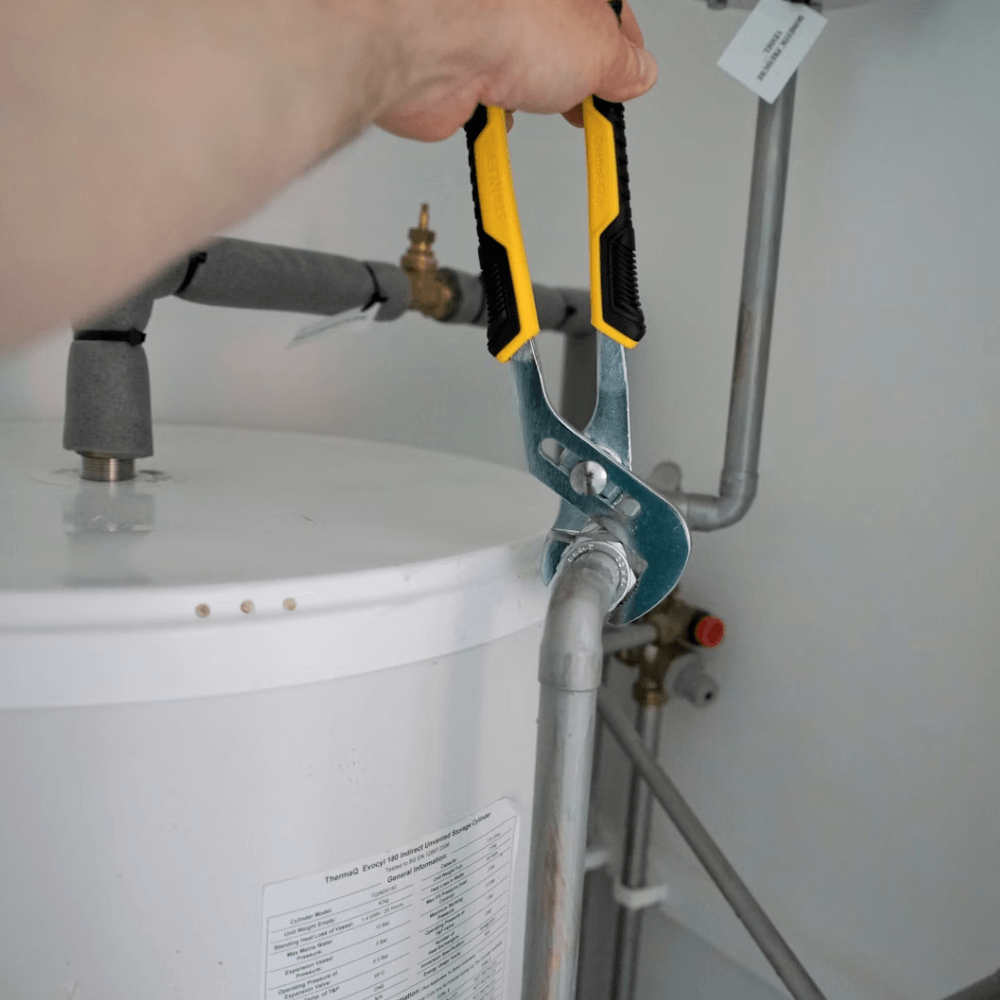
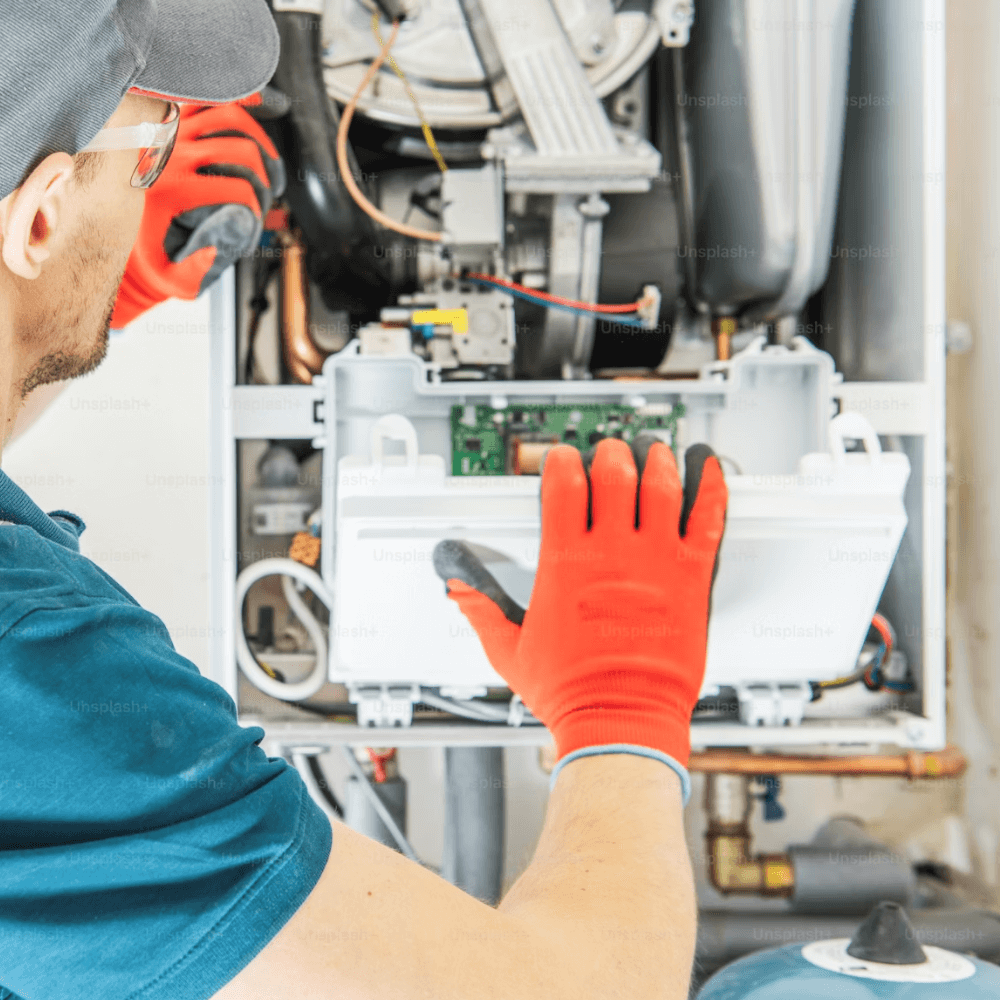
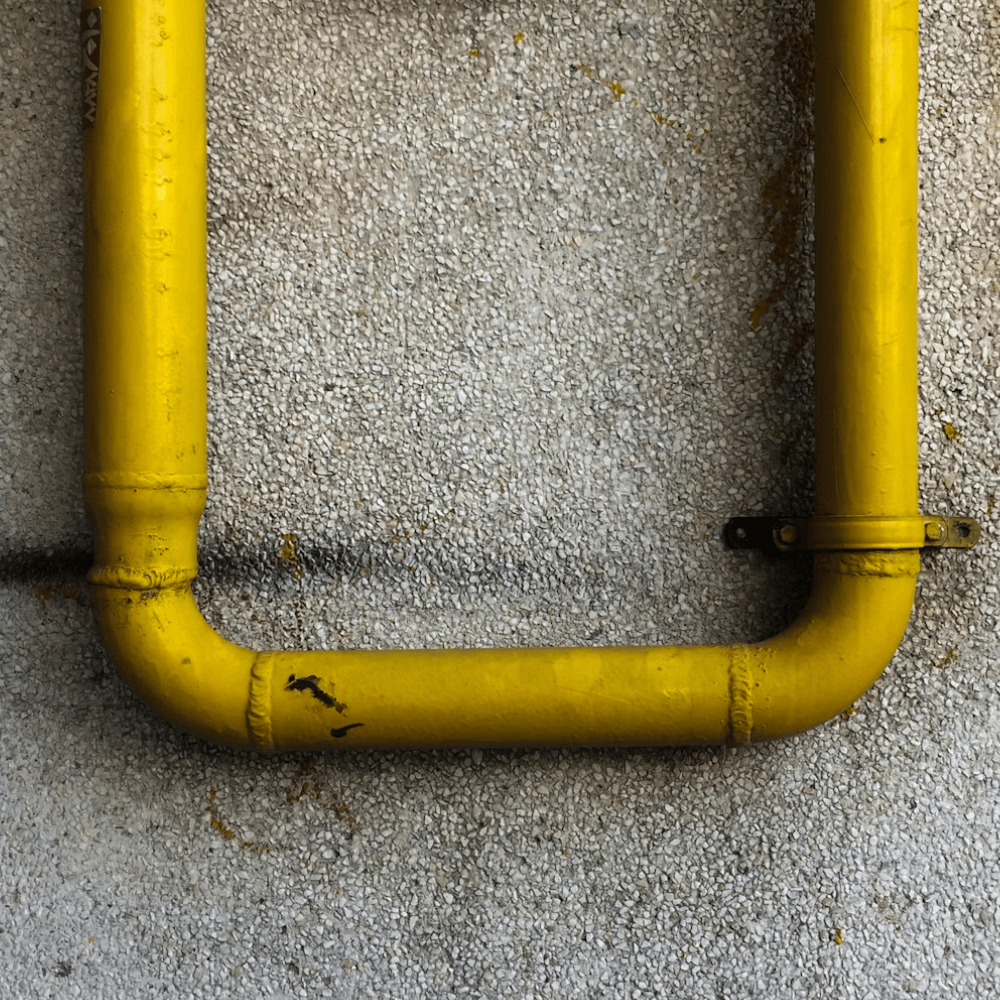
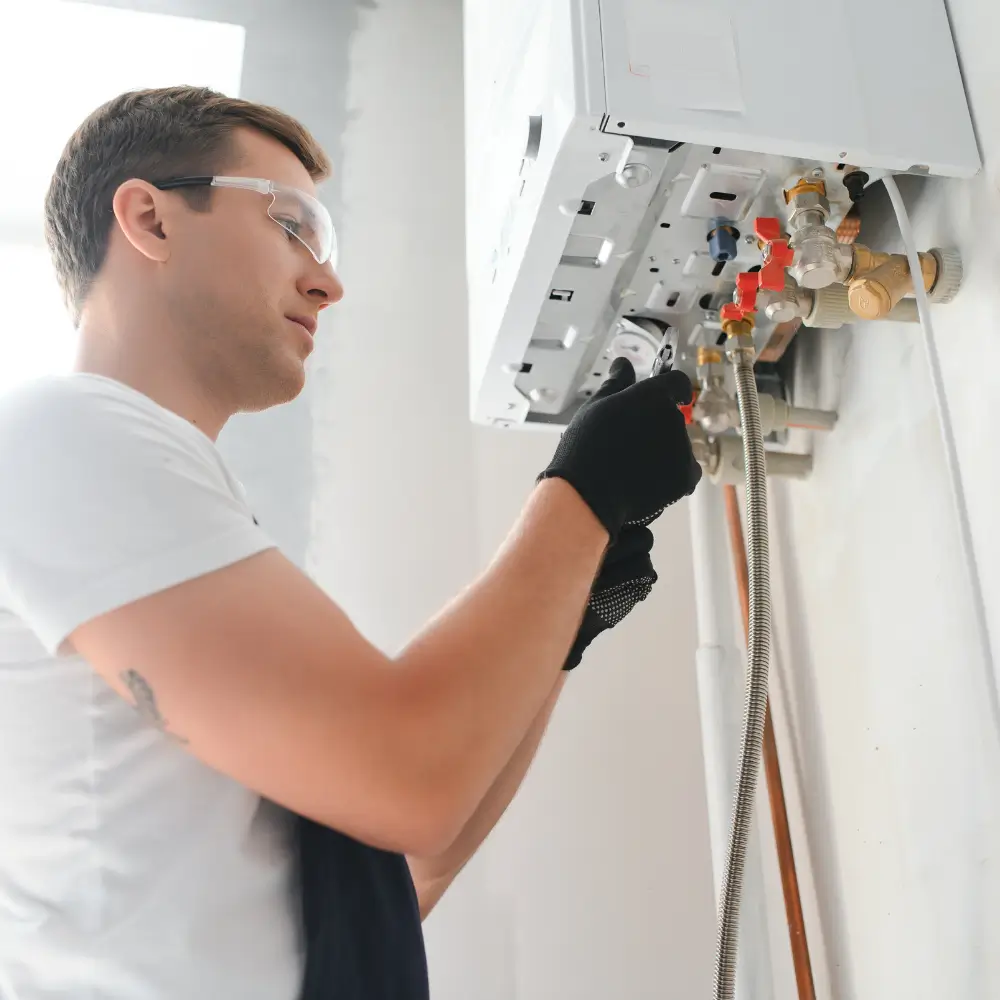
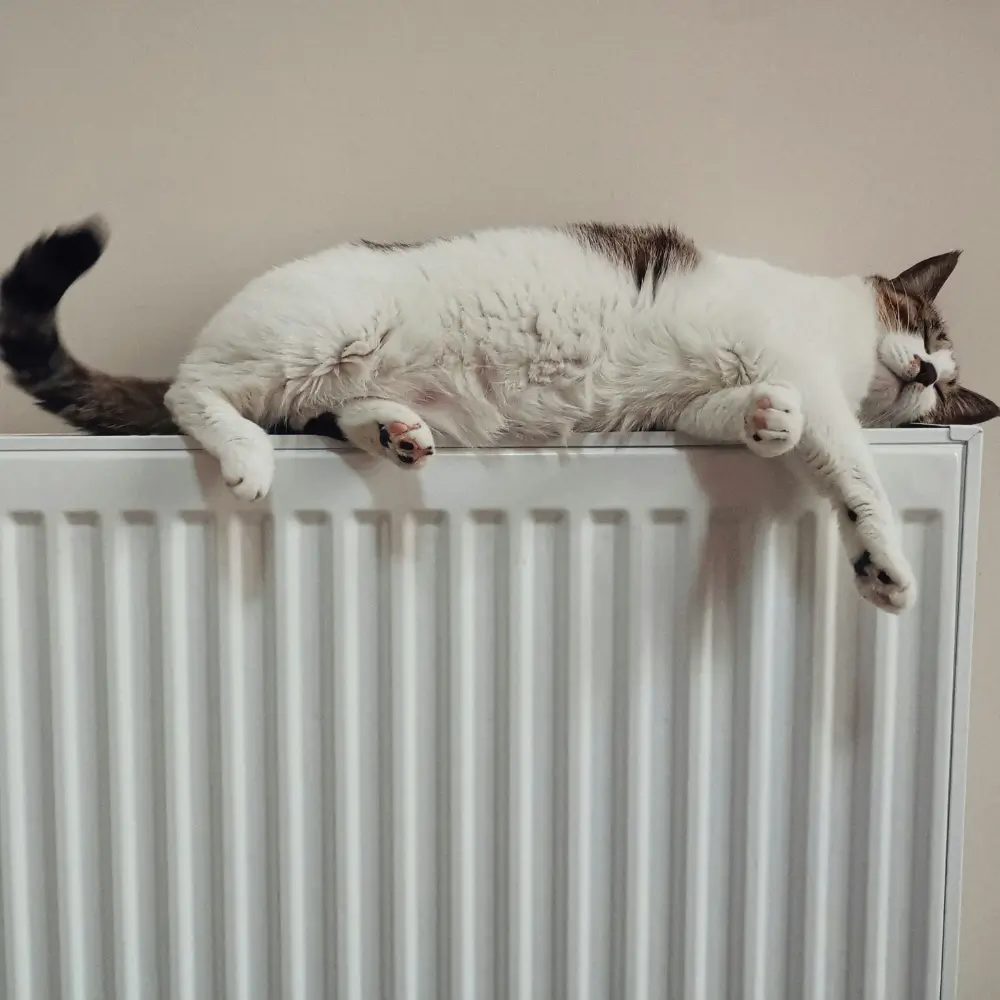
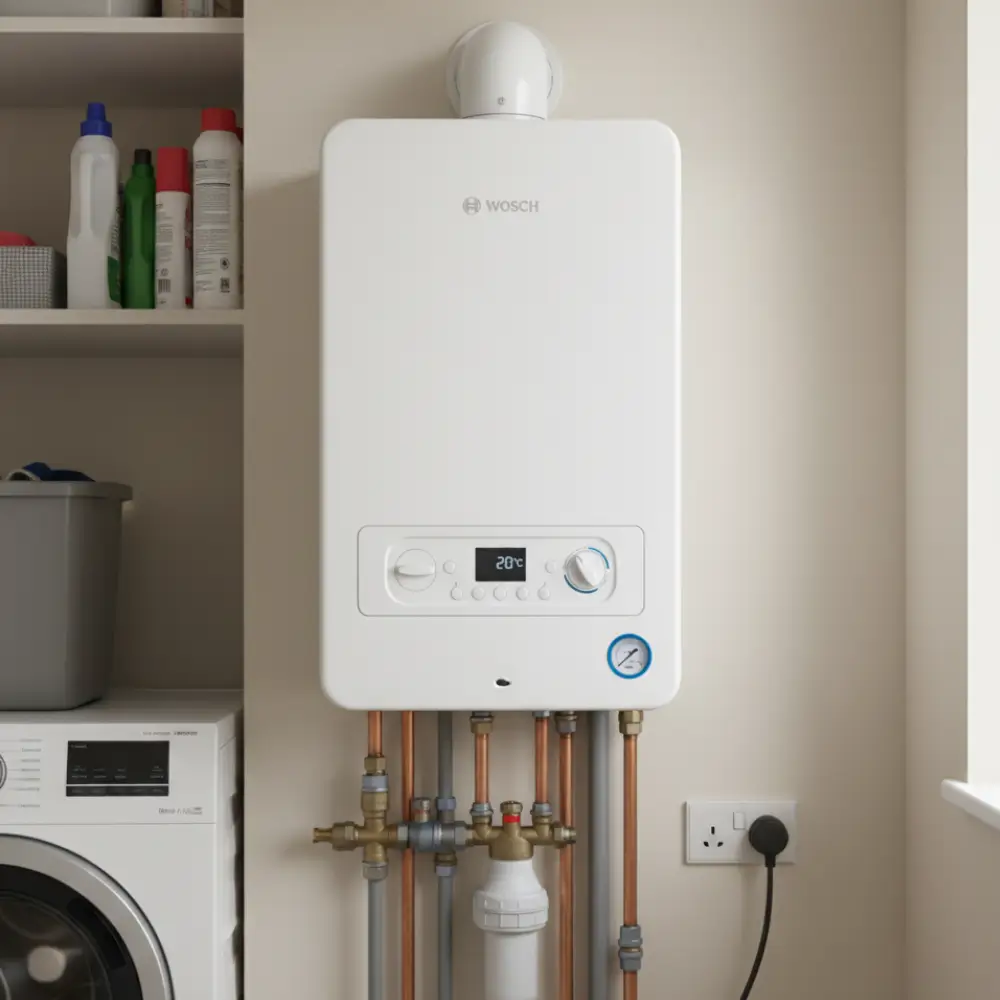
.webp)
.webp)
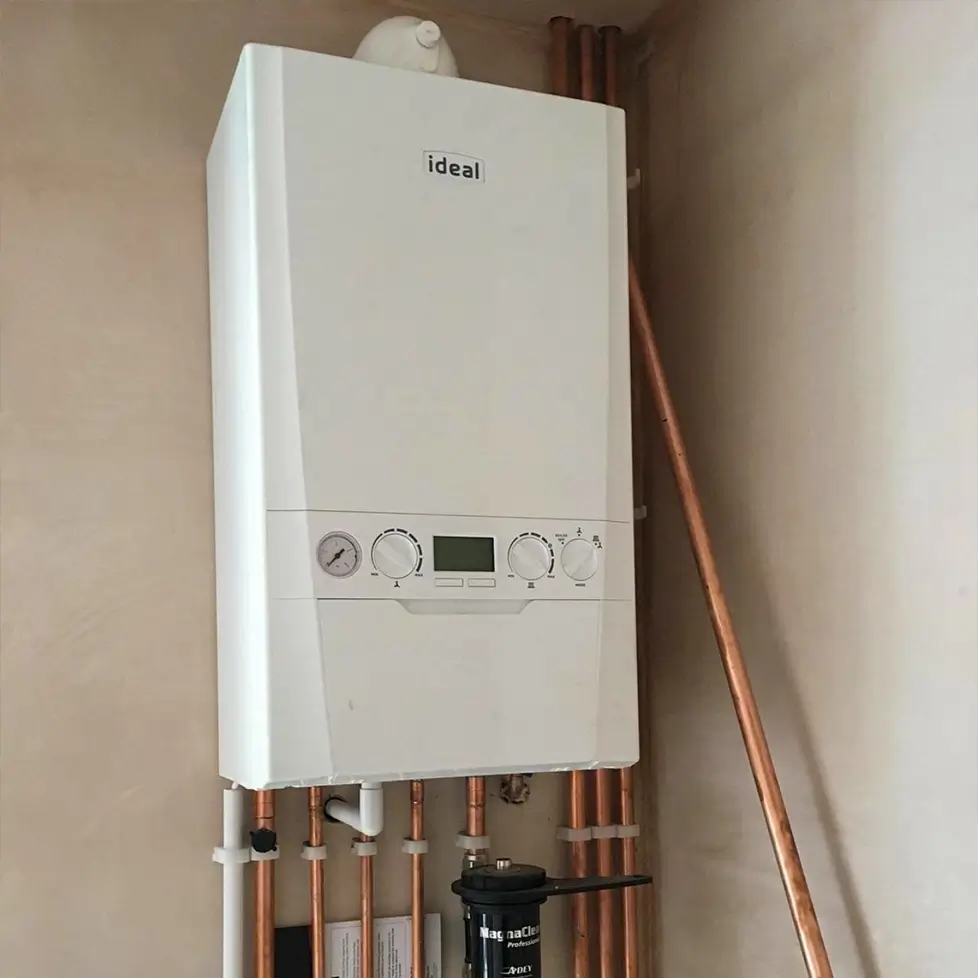
.webp)

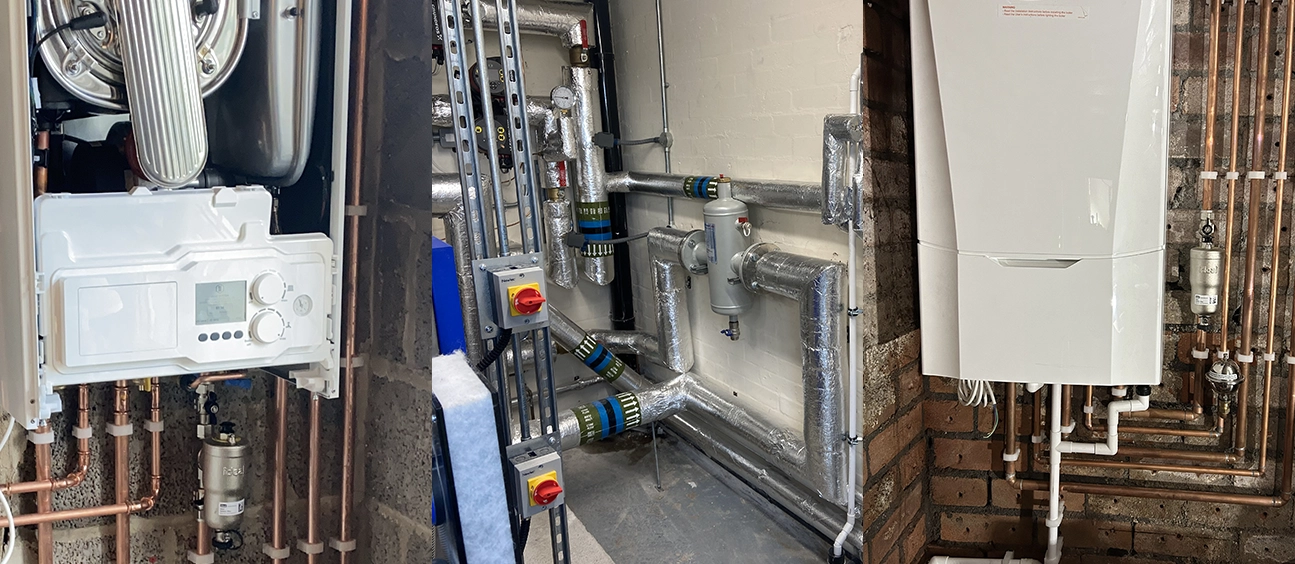
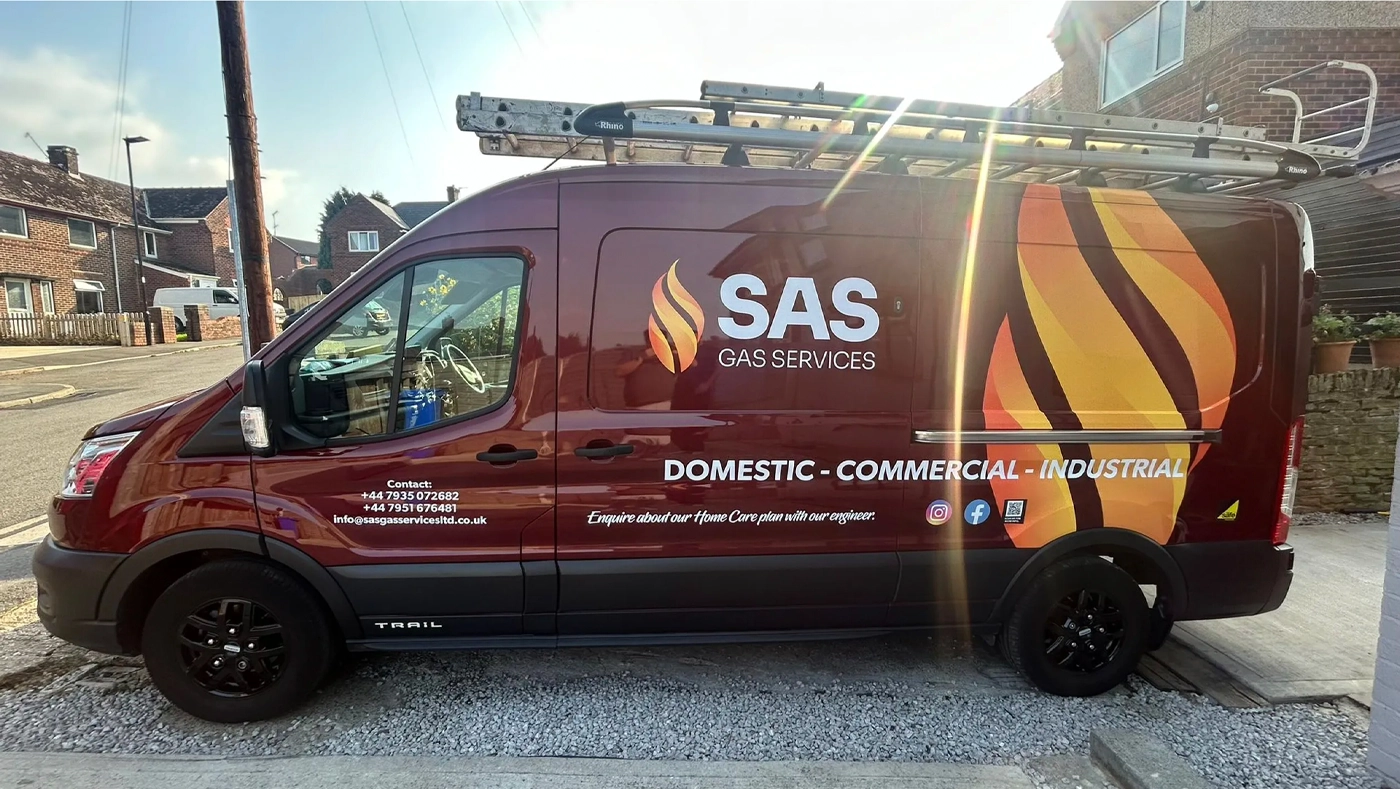
.webp)

